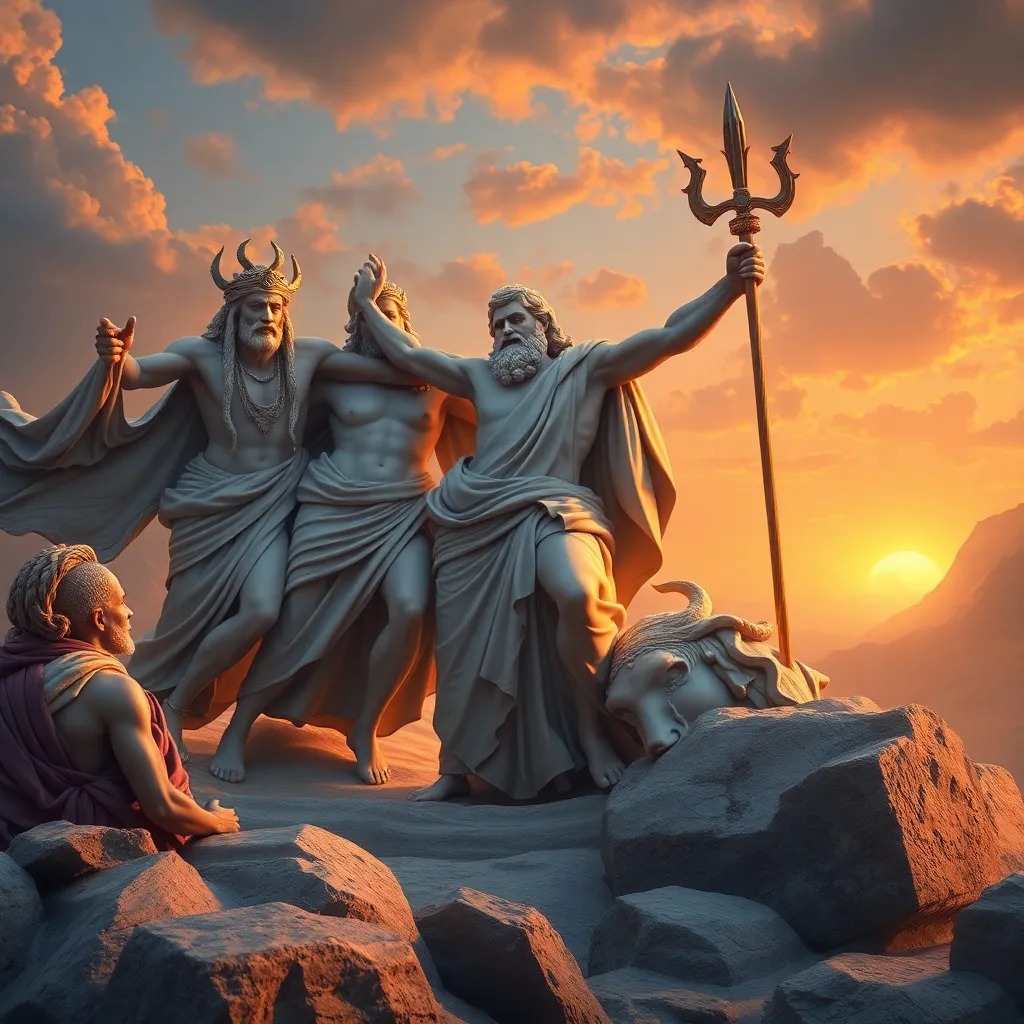Odysseus’s Relationship with the Gods: A Complex Dynamic
I. Introduction
Odysseus, the clever and resilient hero of Homer’s epic poem “The Odyssey,” stands as a central figure in Greek mythology. His journey home from the Trojan War is not merely a tale of adventure but also a profound exploration of human experience, shaped significantly by the influence of the gods. The divine presence looms large over Odysseus’s story, with gods playing pivotal roles in his successes and failures alike. This article examines the complex dynamic between Odysseus and the gods, characterized by favor, conflict, and moral lessons that resonate throughout the narrative.
II. The Role of the Gods in Greek Culture
In Greek mythology, the pantheon of gods is extensive and varied, each possessing unique attributes and powers. These deities were not distant entities; rather, they were believed to actively intervene in human affairs, shaping the destinies of mortals based on their whims and caprices. The gods often reflected human traits and emotions, showcasing a spectrum of behaviors from love and compassion to jealousy and vengeance.
- Major Gods: Zeus, Hera, Poseidon, Athena, and others.
- Human Traits: The gods display human-like qualities, such as anger, love, and pride.
- Divine Intervention: Events in myth often hinge on divine will, influencing mortal lives dramatically.
III. Athena: The Guiding Force
Athena, the goddess of wisdom and warfare, emerges as Odysseus’s primary divine ally throughout his tumultuous journey. Her relationship with Odysseus is marked by a deep mentor-student dynamic, as she not only aids him but also teaches him valuable lessons about strategy, patience, and resilience.
Instances of Athena’s assistance include:
- Guiding Odysseus with advice when he encounters obstacles.
- Disguising him upon his return to Ithaca to protect him from his enemies.
- Encouraging Telemachus, Odysseus’s son, to seek knowledge and bravery.
This mentor-student relationship illustrates the importance of wisdom and strategic thinking in overcoming life’s challenges, emphasizing that divine guidance can lead to personal growth and success.
IV. Poseidon: The Antagonistic God
In stark contrast to Athena, Poseidon embodies the antagonistic forces Odysseus must navigate. The god of the sea harbors a deep grudge against Odysseus for blinding his son, the Cyclops Polyphemus. This animosity manifests in numerous trials Odysseus faces on his journey home.
Key events showcasing Poseidon’s wrath include:
- Storms sent to thwart Odysseus’s ships.
- Encounters with mythical creatures that Poseidon unleashes upon him.
- Delays caused by the sea god that prolong Odysseus’s journey.
The ocean, symbolizing Poseidon’s power, represents the unpredictable nature of divine challenge and the struggle against overwhelming odds.
V. The Influence of Fate and Destiny
The concept of fate plays a crucial role in Greek mythology, often perceived as a predetermined path that mortals are destined to follow. While the gods possess the power to influence fate, they also operate within its confines, showcasing a delicate balance between free will and divine predestination.
Odysseus’s journey illustrates the tension between:
- Free Will: Odysseus often makes choices that reflect his cunning and resourcefulness.
- Divine Influence: The gods’ interventions frequently alter or redirect his path.
- Fate’s Unyielding Nature: Despite his struggles, Odysseus is ultimately guided towards his destiny.
This interplay raises questions about the extent of human agency in the face of divine will, a theme that resonates deeply in the narrative.
VI. The Role of Other Deities
Beyond Athena and Poseidon, other deities such as Hermes, Circe, and Calypso also impact Odysseus’s journey, each representing different facets of divine interaction.
Interactions include:
- Hermes: Acts as a messenger, guiding Odysseus in critical moments, such as when he encounters Circe.
- Circe: Initially an adversary, she becomes a temporary ally, providing Odysseus with valuable knowledge.
- Calypso: Represents both temptation and a longing for home, holding Odysseus captive for years.
These relationships highlight the varying degrees of divine support and opposition, illustrating how each deity influences Odysseus’s journey in unique ways.
VII. Moral Lessons and Human Experience
Through his interactions with the gods, Odysseus learns vital moral lessons that reflect human flaws and virtues. His journey is not just physical but also spiritual, as he grapples with themes of loyalty, perseverance, and humility.
Key lessons include:
- The Value of Wisdom: Athena’s guidance teaches Odysseus that intelligence can often triumph over brute strength.
- The Consequences of Hubris: Poseidon’s wrath serves as a reminder that pride can lead to downfall.
- The Importance of Home: His longing for Ithaca symbolizes the human quest for belonging and identity.
These lessons resonate with contemporary audiences, offering insights into personal challenges and moral dilemmas faced in everyday life.
VIII. Conclusion
In conclusion, the complex dynamic between Odysseus and the gods reveals a rich tapestry of relationships that shape the narrative of “The Odyssey.” From the guiding force of Athena to the antagonistic challenges posed by Poseidon, each interaction offers a window into the human experience, filled with struggle, growth, and moral lessons.
Ultimately, Odysseus’s journey serves as a metaphor for the human condition, underscoring the significance of divine relationships in literature and life. Through his trials and triumphs, we gain a deeper understanding of the interplay between human agency and divine influence, a theme that continues to resonate across cultures and eras.




